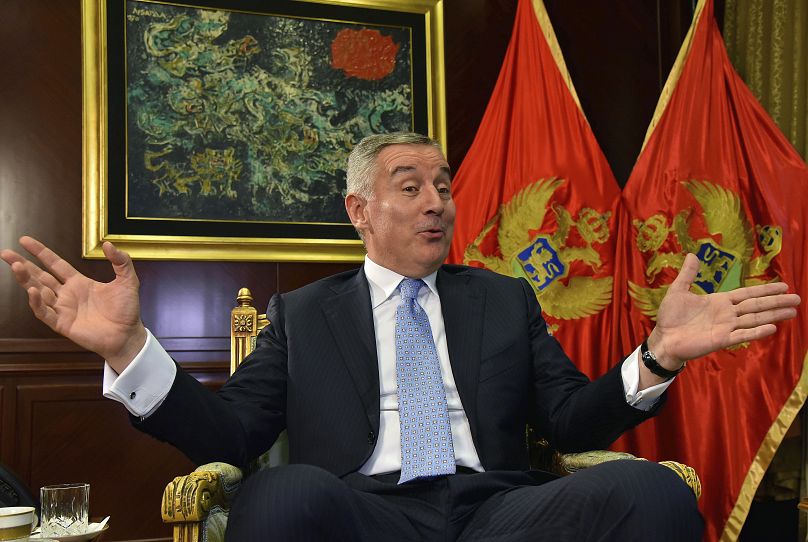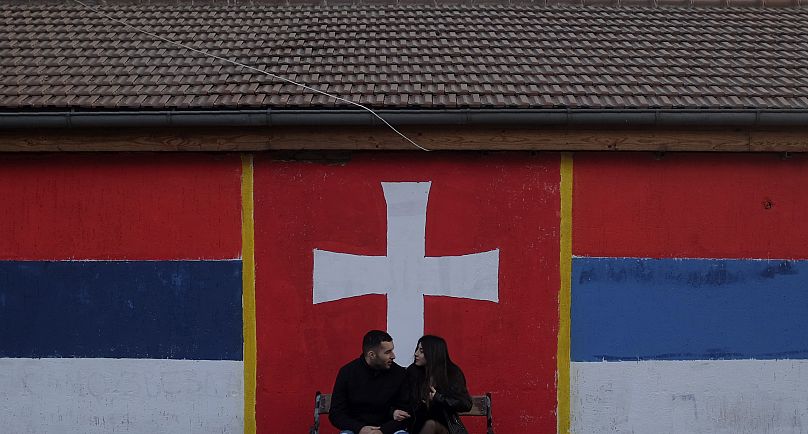A look at the key issues on the minds of Montenegrins as the country heads to vote in a national election on Sunday.
The last time that the country held parliamentary elections it was almost a disaster.
 ADVERTISEMENT
ADVERTISEMENT
 ADVERTISEMENT
ADVERTISEMENT
On the eve of the poll, police arrested a cabal of alleged Russian agents, Serbs and Montenegrin nationals that had planned to stage a coup d’etat, kill the country’s prime minister, Milo Djukanovic, and bring a pro-Moscow government to power.
In 2019, 13 people were convicted over the attack, including two Montenegrin politicians, Andrija Mandic and Milan Knezevic - who were sentenced to five years in jail - and two Russian nationals, convicted of 12 to 15-year jail terms in absentia.
So when Djukanovic, now president, speaks of a plot to prevent his Democratic Party of Socialists (DPS) winning another term in office on 30 August, it is not without merit.
Speaking to AP this week, Djukanovic said that “a media and political war is being waged” against him and his party by those who want to put Montenegro “under the umbrella of Belgrade and Moscow”.
Neither Djukanovic’s office nor a spokesperson for the opposition Democratic Front responded to requests for comment by Euronews.
Like so many of the nations of eastern Europe and the western Balkans, Montenegro has found itself sandwiched between two rival spheres of influence, west and east. Under Djukanovic, Montenegro has very much picked a side.
Once an ally of Serbian leader Slobodan Milošević, Djukanovic later turned his back on Serbia and led Montenegro to independence in 2006. He began talks with Brussels - which are still ongoing - for the Balkan state to join the European Union.
Then months before the last election, Djukanovic began the process of Montenegro joining the transatlantic North Atlantic Treaty Organization (NATO), a move that led to street protests and, it is claimed, the coup. Montenegro eventually joined NATO in 2017.
Djukanovic’s move towards Europe and the west have undoubtedly riled Russia President Vladimir Putin, although Moscow has always denied having a hand in the October 16 coup. It has also angered Serbia, which has developed strong ties with Russia under President Aleksandar Vučić, who visited Moscow in 2017.
Polarisation
But it has also come alongside a polarisation within Montenegro itself, where 55.5% voted for independence from Serbia in 2006, leaving 44.5% of the country that did not. On other issues, Montenegro is similarly divided: 54% of the population, for example, support joining the EU, down from almost 67% just two years ago.
On domestic issues to the country is increasingly split down the middle. A law to require the Serbian Orthodox Church, the largest religious denomination in the country, to prove ownership of its vast landholdings has become a major electoral issue and led to mass street protests and claims that the government is restricting religious freedom.
The furore, says Sinisa Vukovic, a senior lecturer at the School of Advanced International Studies (SAIS) at Johns Hopkins University, reflects the fact that for many Montenegrins the law is not about the ownership of church property but about two competing visions for what Montenegro is, and where it is going.
On the one hand, critics of the law see Montenegro as a country that should be aligned with Belgrade and Moscow, with the Orthodox Christian, Slavic world of which for decades if not centuries it has been a part of. On the other, Djukanovic sees behind the Serbian Orthodox Church the hand of Belgrade and, through it, of Moscow.
“The government believes that in order to regulate the extent of Serbian interests in Montenegro, it has to regulate the role of the church,” Vukovic said.
The reason that this seemingly local - and extremely complex - issue is important geo-politically, Vukovic argued, is because it represents a divide that has echoes across the western Balkans. In Serbia, in Bosnia and Herzegovina and in North Macedonia.
“Montenegro is a litmus test. Paying attention to Montenegro lets you understand what this divergence is about. These are cleavages that have existed for decades, if not centuries, and now they are entrenched. Now it is a matter of: 'You are either with us or against us' - compromise may actually not be on the cards,” he said.
It is almost certain that, come Sunday, Djukanovic will need to compromise to form a government. According to Montenegro’s Centre for Democracy and Human Rights (CEDEM), 35% of Montenegrins support Djukanovic’s electoral list, far short of a majority to govern, meaning a coalition will be necessary for him to rule.
A coalition with the pro-Serbian, pro-Russian and virulently anti-Djukanovic main opposition group, the Democratic Front, is out of the question so Djukanovic will instead need to look at smaller parties, whose backing will likely come at a political price.
Whatever happens on Sunday, Djukanovic - who has now ruled Montenegro as prime minister, president or head of his party for almost 30 years - will almost certainly remain. That, for some Montenegrins, is the problem.
“It would be good for democracy in Montenegro to change the ruling party in power,” said Milena Besic, CEDEM's director, “but the opposition hasn’t used the opportunity for 30 years to grow into an adequate alternative.”
And despite a vocal protest movement on the streets of Podgorica, Djukanovic’s approval ratings are high. For many young people in the country of just over 630,000, he is the only leader they have ever known.
For the older generation, there is a historical precedent for having a charismatic leader running the show.
“People here are used to having one person as an icon - whether it was the king, whether it was Tito, whether it was Slobodan Milosovich or Milo Djukanovic," said Besic.
"Part of the population have this idealistic picture of this one person with charisma - which he definitely has - a person that can lead the country."
If there is an issue other than the Serbian Orthodox Church that galvanises voters in Montenegro it is corruption, and it has dogged government and opposition alike.
EU ascension has stalled due to chapters 23 and 24 of the agreement, relating to corruption and organised crime respectively. While the country has passed the required legislation, Brussels does not consider the laws to have been implemented effectively.
In a 2019 report, the European Commission said that corruption in Montenegro “is prevalent in many areas and remains an area of concern” and that the response of criminal justice towards high-level corruption “remains too limited”. For citizens, corruption is their second-biggest concern, according to an EU survey earlier this year.
The situation was only made worse when, after 2016, opposition parties boycotted parliament and refused to take their seats. As a result, said Besic, laws were adopted by parliament having been voted on only by the government and their allies.
“It made the whole system not trusted by citizens. Corruption is something that is really upsetting the broader public in Montenegro. This is why we see such a low trust in institutions,” she said.
There were also allegations of dirty tricks on election day itself, and not only by those who plotted the coup. Djukanovic’s government revealed the arrests and the plot while polls were still open, arguably increasing their share of the vote.
“The information [about the coup] was given by prosecutor on election day, early in the morning. It could have affected the results. Normally, this information would be given once the polls had closed,” Boris Raonic, president of Montenegro’s Civic Alliance, said.
The fact that it has come to this: a bitter election in a country riven by divisions that are increasingly being manifested along ethnic lines, is a source of deep regret for those on the ground, especially given the fact that Montenegro managed to escape the wanton bloodshed and ethnic warfare that almost destroyed its neighbours 25 years ago.
“These ethnic differences between Serbs and Montenegrins are not visible in Montenegro, except in the political sphere, based on our research,” said Besic.
“It is considered - and it was historically considered - a very slight difference, and it is politics that has made these distinctions more visible and brought them to the front row.”
For Vukovic, those divisions - and these elections - should be at the front of the minds across Europe when Montenegro goes to the polls on Sunday.
Because they certainly will be at the Kremlin.
“For Russia, Montenegro is the soft underbelly of Europe. If you want to weaken or make things more complicated for the Europeans, you hit it in the soft underbelly. You shake things up a little in the Balkans so that Europe need to scramble,” he said.
Just as during the Cold War, it was the US that sought to win the hearts and minds of those behind the Iron Curtain, so Russia is now using soft power in Balkans to gently pull countries like Montenegro away from Europe and into its orbit.
So it doesn’t matter whether Djukanovic wins and his pro-Serbian, pro-Russian adversaries lose, as long as Montenegro is more divided, more chaotic and that the seed grows in the minds of more Montenegrins that the path - towards Europe and the West - is not delivering what it promises: stability, openness, peace.
Moscow is content, Vukovic said, not to stem the tide of Montenegro’s pivot westwards. As long as it can slow it.
“Russia is using media, history and self-victimising narratives - all of the soft power tools - to win the hearts and minds of people in the Balkans. They are playing the long game,” he said.
"And they are winning for now."












